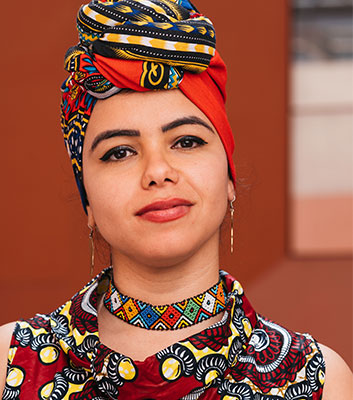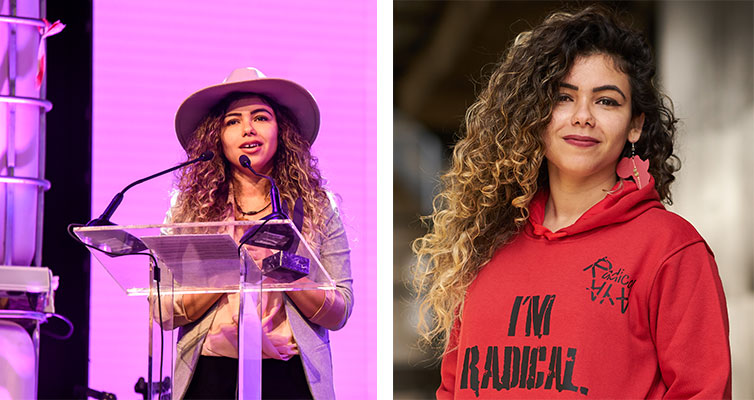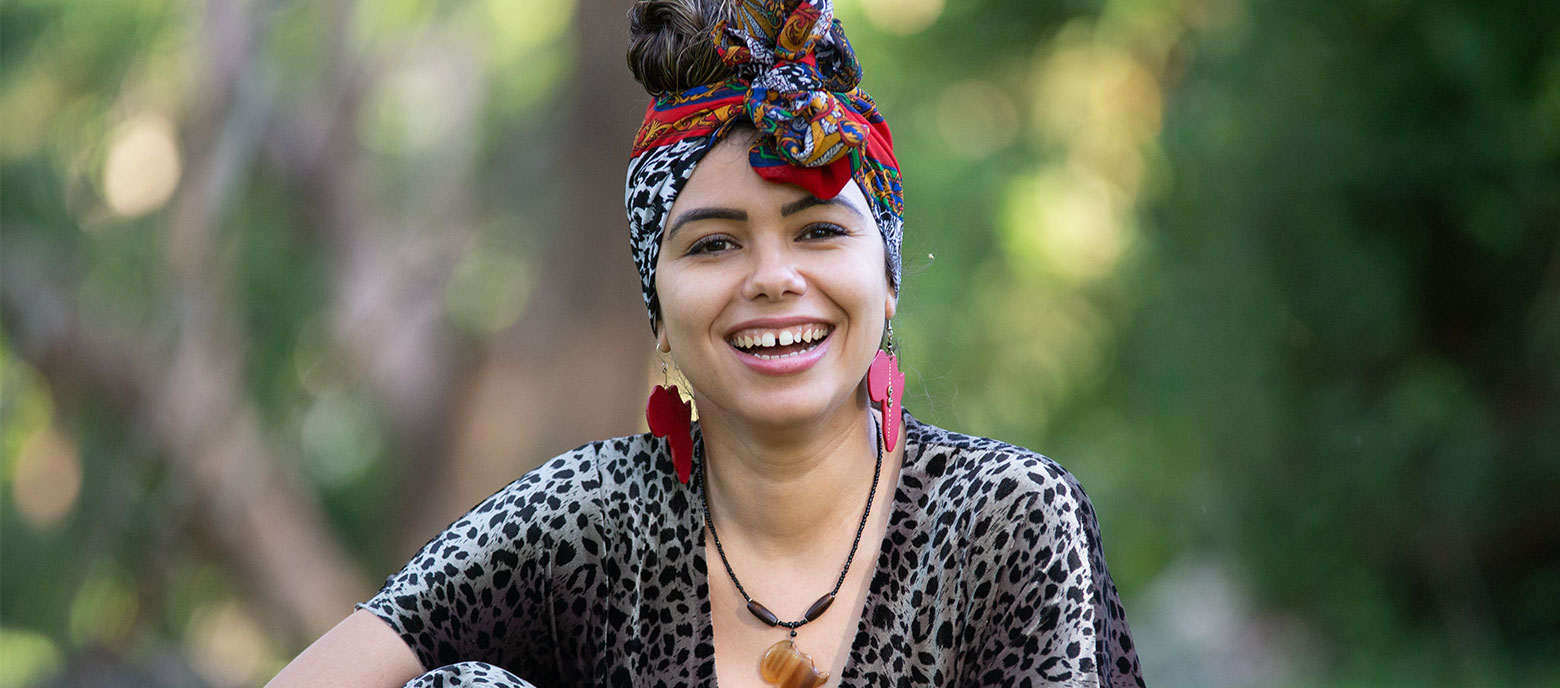Profile
A new narrative
‘Solidarity is believing that my liberation is your liberation. That my struggle is connected to your struggle. That when you win in your own village, I will also win.’ Aya Chebbi looks straight into the camera. Wearing a colourful headscarf and earrings shaped like the African continent, she is speaking to her 26,000 followers in a short video on Twitter. Cyberspace is this young diplomat’s most important tool. A megaphone for projecting her own voice and that of Africa’s young people.

The 32-year-old hails from Tunisia but long since regards herself as Pan-African, as a citizen of this continent and the world. For many, she became the voice of democracy during the 2010/2011 revolution in Tunisia and rose to worldwide fame as a political blogger. Today, she is the African Union’s first Special Envoy on Youth and the youngest diplomat now serving in the cabinet of the AU Chairperson’s Commission.
700 young people applied for the post
Through her work, she strives to amplify young people’s voices and agenda across Africa and get their potential recognised and rights protected in Europe, too. About her role as Special Envoy, she says: ‘We are the youngest continent in the world which is why we need a representative to embody and speak for millions of young people.’ Africa’s young people had demanded one, and more than 700 applied for the post. ‘We have to make the governments of the world see they can no longer lead without us, without young people. And especially with regard to issues of digital transformation, equality and climate justice, we want to and must have our say.’
Chebbi believes that cyberspace is young people’s space. ‘We know how to make meaningful and effective use of it. We recognised its potential from the start and crafted our own rules and structures in everything digital.’ She then goes on to say that with the global coronavirus pandemic the older generation must now find digital ways of exercising diplomacy and reaching people. ‘At this time and moving forward, it’s not enough for them to simply stick to the same traditional bureaucratic ways of doing, they have to shift their physical top-down conferencing to the digital space. They have to speak our language, use our tools properly and adapt.’

The ‘family rebel’
At a very young age, Aya Chebbi experienced patriarchal abuse, violence and discrimination. Experiences she has transformed into resistance and energy. ‘I think everything’s political. We can’t have opinions or a life without our political voice’. In her family, she was often seen as the ‘rebel’. But her father especially always supported her. ‘He would most likely never have referred to himself as a feminist, but he was one. He supported me, even though he didn’t always agree with me. He allowed me to develop a sense of freedom and encouraged me on my path. For him there was never any doubt I could be anything I wanted, irrespective of my gender and age’.
Aya Chebbi was born in Dahmani village on the Tunisian-Algerian borders but went to eight different schools in eight different cities. This came about because her father, who served in the Tunisian army, repeatedly had to relocate. In this time, Chebbi got to know the ‘mosaic’ that is Tunisia, observed regional inequalities, racism and other injustices. And this is one reason why she is driven to regard her continent holistically today. Says Chebbi, ‘We have to get away from regional or nationalist ways of thinking, we need to think borderless and stand up for Africa’s common interests as strong player around the world.’ This is the only way of changing the global narrative about Africa. ‘Europe still Iikes to see itself in the role of donor and Africa as recipient but that has to change, we are equal partners. Africa has potential, with women and youth as our biggest assets, already changing the landscape of the continent and Europe can learn from us. How Africa has been handling the pandemic in a pan-African solidaire multilateral action can be the biggest lesson to the world.’
Digital media could also be helpful here, since they greatly democratise access to political participation. In reality however there are many differences within the international community and within the African continent. Just 30 percent of Africa’s population have access to the internet. And those with access, like Aya Chebbi, are reliant on good connectivity. ‘I haven’t been able to take part in several engagements because of internet challenges even though I’m privileged with access. Imagine youth in remote areas excluded and isolated, we have to work together to rapidly change this and bridge the digital divide,’ says Chebbi.
Not without intergenerational co-leadership
‘Currently and in a few years, young people occupying governments, ministries, parliaments will be more and more making decisions in the name of our continent. That’s why we need to co-lead now and navigate diplomacy and politics. European and African youth must also engage, exchange, experience each other’s realities, speak frankly of racism, migration and decolonization questions, and think about our shared future and cooperation, in order to make better decisions than current leaders. This is the rationale behind the AU-EU Youth Summit that was supposed to take place ahead of the AU-EU Summit, planned for October 2020. Both had to be postponed due to the pandemic. At the conference, European and African participants will co-formulate a roadmap to be presented to decision-makers to secure commitment and accountability. We can rewrite our narrative ourselves,’ says Chebbi.
For Chebbi, fledgling signs of this new narrative are evident in the fact her position as Special Envoy exists at all, and that the selection process was transparent and open: ‘We can be very proud of that. When the narrative of Africa often speaks about a corrupt and intransparent system.’ Her appointment shows that this is only a part of the whole picture.
November 2020
